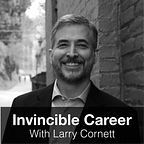
"You can't be successful at everything. We hear a lot of talk about work-life balance. Nonsense. You can't have it all. You can't."
— Alain de Botton
Fame, fortune, and family. Why can’t we have all of those at once?
Why can’t we be amazingly successful at work and wonderful partners to our loved one? Why can’t we rocket up the career ladder and be great parents?
Why can’t we be in peak physical health, read all the books we want, listen to music, play music, be a great dancer, work hard, enjoy vacations, appreciate the little things, and become a billionaire?
I’m sorry, but you can’t have it all. At one time, I thought that it was possible. Heck, I pursued it for many years.
However, you inevitably sacrifice something. I achieved many things that I wanted but lost others that were even more important. I succeeded and failed, and I was miserable in the end.
There is a light at the end of the tunnel, though. You may not be able to have it all (whatever that means), but you can have more of what matters most to you if you take the time to understand yourself better and make some tough decisions.
But why do we think that we can have it all in the first place? Why do we fall for this false dream?
Survivorship bias tricks us
Our social media feeds are chock-full of articles about the super successful. Our “heroes” who supposedly have it all are interviewed, quoted, and shared left and right.
We are so bombarded with their names and stories that we start to believe that achieving their success is realistic. We can have it all too!
"Survivorship bias also flash-freezes your brain into a state of ignorance from which you believe success is more common than it truly is and therefore you leap to the conclusion that it also must be easier to obtain."
— David McRaney, Survivorship Bias
Privilege fools us
The people we think “have it all” aren’t like you and me. Chasing in their footsteps will often take you down a path of misery and failure.
Why? Because these people had numerous hidden advantages and lucky timing that you will never replicate fully.
Malcolm Gladwell's "Outliers: The Story of Success" provides numerous examples across multiple domains (e.g., sports, politics, and business) that "success arises out of the steady accumulation of advantages." These advantages include lucky timing and being given extraordinary opportunities.
We can’t have it all just like our heroes because they have privileges that we will never enjoy. But, the reality is they don’t really have it all either, despite what their social media presence shows.
It’s fundamentally impossible
I’ve had this conversation with so many people before. People who become surprisingly upset and angry when I say that it’s impossible to have it all.
They say that I don’t know what I’m talking about. They are different. They are special. They will be the ones who are wildly successful and able to really have it all.
The problem is, I can’t think of a single person who does have it all. Occasionally, someone appears to be that magical unicorn. But, inevitably, the truth comes out, and I discover that some aspect of their life is a complete train wreck.
Have you read about the personal lives of Steve Jobs and Elon Musk? Have you witnessed the drama of the failed marriages of Jeff Bezos and Bill Gates? They seem like they must have it all, but their private lives are falling apart behind the scenes.
Tony Robbins (speaking of train wrecks) once mentioned in a podcast that he knows plenty of successful, wealthy people who simply aren't happy. "Money makes you more of who you are… it doesn't change people."
If all of these billionaires cannot make it work and have it all, what are our chances? It’s almost as if it’s fundamentally impossible to have it all.
That’s because the hours in your day are finite (unless you have a secret time machine). Your attention is finite. Your energy is finite.
The more you fragment your time, attention, and energy trying to do it all, the less value you deliver to each task and activity. You will start to fail at some things, perhaps even everything.
Would you rather lose it all?
You cannot — and you should not — try to excel in everything at the same time.
Job
Title
Career
Wealth
Fitness
Health
Relationship with a significant other
Role as a parent
Friendships
Self-improvement
If you try, you will be stressed, anxious, and eventually burn out. Worse, you will fail to achieve goals that are more important than the numerous tasks that are nibbling away at your time.
For example, I failed at being a good parent when I was trying to be a great employee. I was so focused on my career for years that I wasn’t around as much as I should have been.
I feel incredibly sad about those lost years because you can never get them back. Never.
If you don’t want to fail, you can intentionally choose what you want to focus on now and what must wait. You can stop kidding yourself that you are capable of simultaneously juggling every single ball in your life.
Be honest about the choices you are making. Admit the tradeoffs you are choosing.
It’s more empowering to be in control of your decisions about how you want to focus your time and energy. No one can really do it all, all of the time.
“But what if the answer isn’t to do more? What if the answer is to want less? What if the solution is simply accepting our bounded potential, our unfortunate tendency as humans to inhabit only one place in space and time. What if we recognize our life’s inevitable limitations and then prioritize what we care about based on those limitations? What if it’s as simple as stating, ‘This is what I choose to value more than everything else,’ and then living with it?”
— Mark Manson
Please don’t fall for the BS that people spout about having it all, either. They don’t, and they never will, no matter how much they scream that they are. Watch people’s lives long enough, and you will see the cracks in the veneer.
Yes, you will sometimes have to prioritize work over your life (like I did). Especially if you’re trying to climb the ladder aggressively, make as much money as possible, and invest it for your future.
However, when you create a long-term plan and intentionally make those choices, you know when it’s time to switch gears too. You know when you want to shuffle your priorities and put more important things on top (like your family and your health).
You can have more of what matters
No, you can’t do it all or have it all. But, you can have more of what matters the most to you.
What if I told you that it’s better to ruthlessly prioritize how you spend your days so you can focus more on fewer things?
When I did that, I put my family and health at the top of the list. My career was no longer in the number one position. As I mentioned, it had been for years.
However, I decided that enough was enough. My family relationships and my health had suffered for too long. I couldn’t keep doing that.
With age and experience, there comes a little bit of wisdom. I accepted that I could not have it all. I made peace with that.
I’d had a great 20 years in my first career and accomplished most of what I wanted (e.g., founding a tech startup). But, now it was time for my career to take a back seat to my family and health.
However, if we wanted to dial back my work and income, we also had to dial back our lifestyle and expenditures. If I wanted the freedom to create a new definition of “having it all,” I had to leave the Silicon Valley rat race.
When you’re deep in a bubble like that, it is all-consuming. You can’t imagine doing anything else or living any other way. It seems more important than it really is.
Taking a step away from that crazy world for a few months gave me a new perspective on life. Getting out of the Bay Area tech bubble refreshed my view of the world too.
I’m not saying that it happened overnight or that it was easy. It was a painful process of letting go and rebirth. But, the funny thing is that now I’m happier than I ever was before.
I have less of what I used to think mattered, but I discovered actually mattered very little (e.g., title, money, possessions). I have more of what matters most to me now (e.g., time with my family, freedom, health), which makes me more than satisfied that I gave up my old ideas of trying to have it all.
How to take back control
If you prioritize everything in your life into a force-ranked list, what would that list look like? Consider all dimensions of your life; love, family, friendships, health, fitness, career, possessions, nest egg, etc.
Are you spending your time and energy where you want? If not, what’s your long-term plan for changing that?
I was recently talking with a client about this problem of trying to juggle it all, feeling overwhelmed, and burning out. Everything felt urgent and important. Everything wanted their time.
What can you do about it? How can you take back control of where you focus your time and energy? Here are a few steps that can help.
Define what having it all means for you
Question each item you put on your “Having it All” list. Use the Five Whys technique to get to the root of each one (e.g., Why do I want this?). Ask yourself why for each answer. Why? Why? Why?
For example, I used to think that my job title was an important item on my list of having it all. I had to become an executive. Being a CEO someday was part of that vision.
I had a taste of both and found out that it didn’t matter to me. The higher I climbed the career ladder, the less appealing that line item was. I deprioritized it and, eventually, it dropped off my list entirely.
Create a prioritized list
After you’re done questioning everything, create a prioritized list from the items that make the cut. Don't give things the priority that someone else thinks they deserve (e.g., your employer).
Be true to yourself and your needs. Prioritize the list based on how you feel about things and what you want.
Explore the Eisenhower Matrix
“What is important is seldom urgent and what is urgent is seldom important.”
― Dwight D. Eisenhower
Put all of your tasks and activities into an Eisenhower Decision Matrix. Determine how urgent and vital each one is.
Urgent and Important Tasks need your prompt attention (e.g., getting your car repaired)
Not Urgent but Important Tasks deserve your attention, but you tend to put them off (e.g., writing a book that will help your career)
Urgent and Not Important Tasks are the usual firefighting activities that you should learn to avoid or delegate (e.g., your boss tells you to attend a birthday party planning meeting)
Not Urgent and Not Important Tasks are sometimes useful for relaxing (e.g., playing guitar), but often they are wasting your time and providing no value (e.g., scrolling through Instagram)
Escape the zero-sum game
Some activities steal time from more important items on your list. Directly trading time for money is one of those traps.
It is better to invest an hour in an activity that generates returns forever instead of paying you once. I face this tradeoff in my business all the time.
When someone hires me for an hour of consulting time, I get paid once for that hour of work. That hour is gone, and I never make any more income from that moment in time ever again. But, when I spend an hour writing an engaging story for Medium, that activity generates income forever!
Read Naval Ravikant's excellent post How to Get Rich. He talks about what true wealth is, its purpose, and finding your leverage.
“Wealth is the thing you want. Wealth is assets that earn while you sleep; it’s the factory of robots cranking out things. Wealth is the computer program running at night that’s serving other customers. Wealth is money in the bank that is reinvested into other assets and businesses.”
— Naval Ravikant
Only give items the time they deserve
Give tasks and activities the time you think they deserve, not the time they want or even require. This is a hard step to take, but it will create a fundamental shift in your life and how you spend your time.
For example, marketing my business could easily consume eight hours of my day. Will it take all of that time if I let it? Yes, it could easily eat up my entire day.
Does it deserve all that time? Nope! I have more important things on my list.
Time box activities that you must do but don’t deserve unfettered access to all of your time and attention. It also forces you to be more efficient because work expands to fill the time you give it anyway (i.e., Parkinson’s Law).
Evaluate each prioritization decision
First, assess the commitment of time, attention, and energy for each time on your list from the top down. Next, decide how to budget your resources to the list. Your time is finite, so choosing to do one thing means you can do less of another thing.
For example, if you decide to dedicate six hours per week to item #4, where does that time come from? What will you give up to make that happen?
Finally, do a cost-benefit analysis:
Will you be satisfied with this tradeoff in the short term, if it pays off (e.g., less time with your family to get promoted in six months)?
Will you still be happy with this choice in the long run (e.g., the sacrifice was worth landing that executive role, even if your children feel less connected to you years from now)?
I can hear some people saying, “Larry, knock it off with the exaggerated scare tactics!”
But, I’m not making up a fictional example. It’s from my life.
I worked really long hours for over six years (12-14 hour days, nights, weekends, no vacations) to land a series of promotions. Don’t get me wrong; I’m grateful for the support and recognition. The salary boosts helped give my family a nice life.
But I paid a heavy price. Years later, one of my young children said to my wife, “I’m a little nervous around Dad because I don’t really know him.”
They barely saw me Monday through Friday, and work even interrupted my weekends with them. How do you think it made me feel when I heard that my own child didn’t know me?
It broke my damn heart. I can never get that time back, and my relationships with my children will never be as strong as what they have with my wife.
Use time blocking
Time block your calendar and fiercely protect your scheduled high-priority activities. This is especially useful for those “Not Urgent but Important Tasks” that we tend to put off forever.
“Sometimes people ask why I bother with such a detailed level of planning. My answer is simple: it generates a massive amount of productivity. A 40 hour time-blocked work week, I estimate, produces the same amount of output as a 60+ hour work week pursued without structure.”
— Cal Newport, author of Deep Work: Rules for Focused Success in a Distracted World
I use time blocking to ensure that I have dedicated calendar time for the most important activities. Otherwise, all of those urgent little things creep in and steal away my days.
For example, I set up recurring time blocks for:
Morning journaling
Daily exercise
Working on my podcast
Writing newsletters and articles
Marketing activities
Time with my community
Strategically working on my business (instead of always in it)
Time with my family
Read more about time blocking, day theming, time boxing, and task batching in this excellent post by Todoist.
Protect your scarce resources
Aggressively protect and manage your time, attention, and energy as your most precious resources.
Eliminate energy vampires (e.g., people that drag you down and argue with you online)
Delegate tasks that you do not want to do
Delegate activities that you should not be doing
Don't let other people force themselves into your working moments or life (e.g., set up do not disturb on your phone, let calls go to voicemail, batch respond to messages)
I hope you can redefine what “having it all” means for you so that it’s realistic, achievable, and gives you a sense of happiness and fulfillment. I also hope that some of these strategies can help you reclaim your time and freedom to focus on what matters the most to you!
⬆️ Scroll to the top if you want to listen to my expanded discussion of this newsletter article 🎧
A way to support my newsletter
I know that not everyone is ready to become a paid subscriber. But, there is a great way you can support my work without spending any money:
📣 Recommending my newsletter on social media.
It only takes a few seconds, and it helps grow my business so I can continue making time to write it.
I'll even provide some copy and paste text to make it easy to share on Twitter, LinkedIn, Facebook, etc. Thanks in advance!
I've really been enjoying the Invincible Career newsletter by Larry Cornett (@cornett). If you want to get ahead in your career and you aren’t subscribed yet, you’re missing out.
https://newsletter.invinciblecareer.com
This week’s professional development challenge
⭐ Audit Your Professional Brand
This challenge helps you maintain a consistent professional brand everywhere you exist online. The longer you’ve been using the internet, the more profiles you may have. They can quickly get out of synch. Completing this challenge gets your profiles aligned with each other and ensures they clearly support your professional brand. Tracking all of the accounts and information in a spreadsheet makes it easier to update later.
Larry Cornett is a leadership coach and business advisor who also hosts:
A free Slack community for ambitious professionals who want to create an invincible career.
A professional mastermind community for solopreneurs and entrepreneurs.
A free community for independent creators who want to make a living doing more of what they love.
He lives in Northern California near Lake Tahoe with his wife and children, and a gigantic Great Dane. He does his best to share advice that can help others take full control of their work and life. He’s also on Twitter @cornett.











